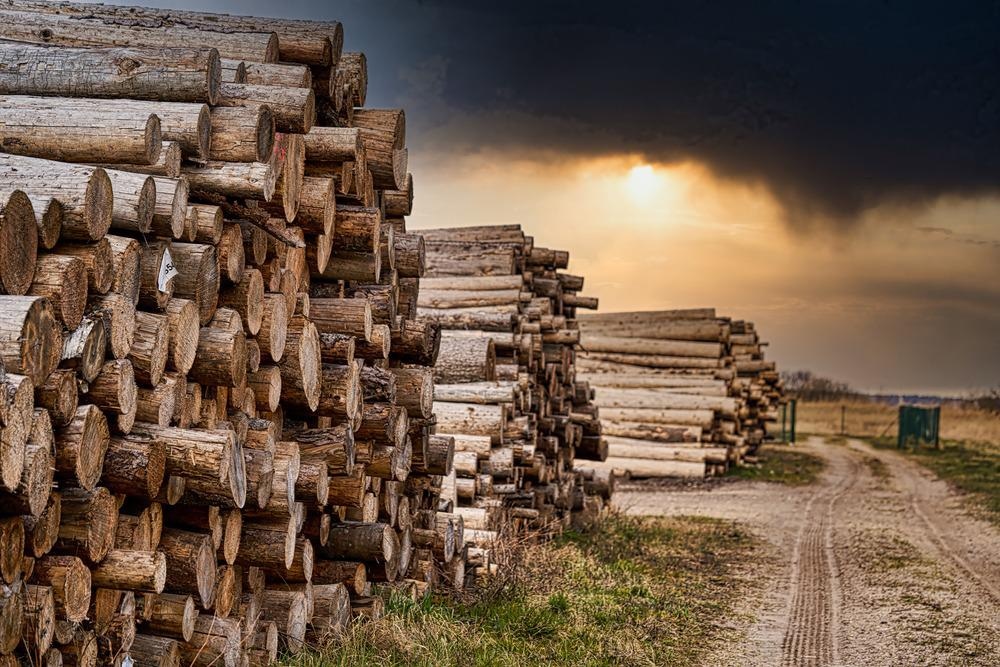Wood has been a fundamental resource for humans since the beginning of civilization. In modern times, as production ramps up, along with population growth, so does the extent to which we waste vast amounts of woody material. Without being recycled, this is not only an environmental loss, but an economic one. What if wood could be re-used chemically rather than going to a landfill? Lixea has developed woody biomass solutions that allow any wood to be recycled by extracting two fundamental properties.

Image Credit: OlegRi/Shutterstock.com
Wood is being wasted every day in our local areas and the rest of the world.
Wood waste comes from forestry and many other industries such as building and construction.
In the EU and US, approximately 100 million tons of wood waste is thrown out every year, and most come from urban areas. This is because any unwanted woody material, contaminated or not, is an underutilized resource that can be re-used to make valuable materials.
Humans tend to rely on crude oil when creating materials. This can be wasteful since products are usually discarded once used. Lixea is developing novel chemical processes and woody biomass solutions that allow us to be more sustainable.
The company is developing an innovative biomass fractionation process using low-cost ionic liquids. Through Lixea’s unique BioFlex solvent process, unwanted wood materials can be re-used and made into bioplastics, as well as common chemicals and novel materials.
Converting all Kinds of Woody Biomass
Lixea gives wood waste a second lease of life by dissolving it and extracting raw materials through its BioFlex technology.
Lixea’s Dendronic process offers an alternative to petrochemicals while re-using waste. Different kinds of lignocellulosic biomass can be used, such as wood waste from construction, forest residues and agricultural by-products, energy crops, as well as sustainably grown biomass. This includes hardwoods and softwoods as well as heavy metal contaminated mixed waste wood such as those with paints and preservatives. Even unrecyclable woody biomass can be utilized.
Most feedstocks can be treated and utilized. Currently being piloted, Lixea is keen to validate the process further with as many types of wood as possible, particularly materials that are considered waste, sent to landfill, or incinerated.
Woody Biomass Solutions with Ionic Liquids
Lixea uses ionic liquid to extract the main components of the wood – lignin and cellulose, which can be used to create useful materials for industrial applications, such as renewable chemicals, fuels, and materials.
Ionic liquids are a type of solvent made up entirely of ions, melting below 100 ◦C, with very low vapor pressure, making them safe to handle in the atmosphere, without releasing emissions. These liquids are easily used to recycle a range of feedstocks, such as demolition wood and residue from agriculture.
Such liquids tend to have high production costs which restrict their industrial commercialization. Lixea’s team based at Imperial College London (ICL) has designed more affordable ionic liquids, which are accessible for diverse, sustainable applications.
Lixea uses ionic liquids that are easily synthesized from bulk chemicals that are thermally stable and economic, being less expensive than traditional organic solvents.
Lixea’s woody biomass solutions are seamless as the cellulose they produce is unique in that it has very low levels of hemicellulose and is highly crystalline. The dendronic lignin is also nearly completely carbohydrate-free and has a pleasant aroma.
Additional products can be isolated, such as heavy metals, furfural, and acetic acid, which are used in the chemical industry. These products can be used for a range of applications or the creation of new items.
Fueling a Circular Bioeconomy
By helping to bring about alternatives to crude oil, Lixea supports the bioeconomy, as explained on the company’s website:
Lixea’s proprietary process enables the use of any type of woody material for the large-scale production of bio-derived materials, chemicals and fuels. As such, we are promoting the bioeconomy, an economic concept where wood and other forms of lignocellulosic biomass are used instead of crude oil to produce heat, electricity, materials and chemicals.
According to reports, the market is estimated to be worth just under 50 billion Euros for BioFlex-made cellulose, and around 13.4 billion Euros for wood waste recycling.
In addition to ICL, Lixea is supported and affiliated with a range of leading institutions such as The Royal Society, Tech Nation Net Zero, Royal Academy of Engineering, and the Grantham Institute for Climate Change.
For its BioFlex project, Lixea received funding from the European Union’s Horizon 2020 research and innovation program. A pilot plant is currently being built in Backhammar, Sweden.
Converting waste into raw materials that can be re-used will fuel the circular economy - the only economic model that is considered entirely sustainable.
Lixea helps to make such a sustainable world closer to reality, by seeking to re-use any unwanted wood waste for a range of industrial uses.
The company is keen to test as many kinds of wood waste as possible to continually refine, validate, and improve its process.
Boosting our global recycling capabilities with such a widespread, commonly used material such as wood will surely have a sustainable impact in the future, in line with seven of the United Nations Sustainable Development Goals to save the planet by 2030.
References and Further Reading
Lixea – homepage [Online]. Available at: https://www.lixea.co/
Second life of wood: BioFlex technology to dissolve waste wood to get raw materials [Online]. Cordis Europa. Available at: https://cordis.europa.eu/project/id/946203
Sustainable Development Goals [Online]. United Nations Foundation. Available at: https://unfoundation.org/what-we-do/issues/sustainable-development-goals/
Waste wood collection [Online]. Business waste. Available at: https://www.businesswaste.co.uk/waste-wood-collection/
Disclaimer: The views expressed here are those of the author expressed in their private capacity and do not necessarily represent the views of AZoM.com Limited T/A AZoNetwork the owner and operator of this website. This disclaimer forms part of the Terms and conditions of use of this website.